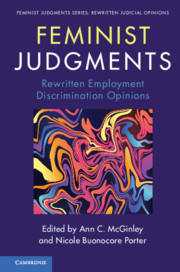Book contents
- Feminist Judgments: Rewritten Employment Discrimination Opinions
- Feminist Judgments Series Editors
- Advisory Panel for Feminist Judgments Series
- Feminist Judgments: Rewritten Employment Discrimination Opinions
- Copyright page
- Dedication
- Contents
- Advisory Panel for Feminist Judgments: Rewritten Employment Discrimination Opinions
- Notes on Contributors
- Preface
- Acknowledgments
- 1 Introduction
- 2 Supreme Court and Gender Narratives
- 3 Pregnancy Discrimination
- 4 Intersectional Approaches to Appearances
- 5 Harassment Because of Sex
- 6 Sexual Orientation and Gender Identity Discrimination as Sex Discrimination
- 7 Systemic Claims and Gender: Proving Disparate Treatment and Impact
- 8 Retaliation
- Index
8 - Retaliation
Published online by Cambridge University Press: 01 October 2020
- Feminist Judgments: Rewritten Employment Discrimination Opinions
- Feminist Judgments Series Editors
- Advisory Panel for Feminist Judgments Series
- Feminist Judgments: Rewritten Employment Discrimination Opinions
- Copyright page
- Dedication
- Contents
- Advisory Panel for Feminist Judgments: Rewritten Employment Discrimination Opinions
- Notes on Contributors
- Preface
- Acknowledgments
- 1 Introduction
- 2 Supreme Court and Gender Narratives
- 3 Pregnancy Discrimination
- 4 Intersectional Approaches to Appearances
- 5 Harassment Because of Sex
- 6 Sexual Orientation and Gender Identity Discrimination as Sex Discrimination
- 7 Systemic Claims and Gender: Proving Disparate Treatment and Impact
- 8 Retaliation
- Index
Summary
Chapter 8 rewrites Clark County School District v. Breeden, which held that the plaintiff’s retaliation claim under Title VII failed because no reasonable person could believe that a single incident of harassment violated Title VII. The rewritten opinion, exposing the bias many women suffer in the workplace as a result of micro-aggressions and using the perspective of a reasonable person in the plaintiff’s shoes, holds that complaining about even a single incident of harassment is sufficient to constitute a reasonable belief that the plaintiff is experiencing harassment. The rewritten opinion also broadens the causation element in retaliation cases in two ways. First, it refuses to set a bright-line rule for the passage of time between the protected activity and the adverse employment action. Second, it allows mixed-motive causation rather than but-for causation, which would make retaliation claims easier to win and would have eliminated the Nassar case, where the Court held that plaintiffs had to prove that retaliation was the but-for cause of the adverse employment action.
Keywords
Information
- Type
- Chapter
- Information
- Feminist JudgmentsRewritten Employment Discrimination Opinions, pp. 462 - 485Publisher: Cambridge University PressPrint publication year: 2020
